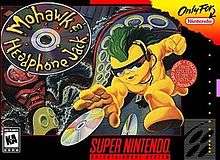Mohawk & Headphone Jack
| Mohawk & Headphone Jack | |
|---|---|
 North American cover art | |
| Developer(s) | Solid Software |
| Publisher(s) | |
| Designer(s) |
D. Scott Williamson Martin Alessi Lou Moskalski Michael Cihak Tim Coman |
| Composer(s) |
Mike Cihak Matt Scott Byte Size Sound[1] |
| Platform(s) | Super NES |
| Release date(s) | |
| Genre(s) | 2D action platformer |
| Mode(s) |
Single-player Multiplayer (Alternating turns) |
Mohawk & Headphone Jack is a 1996 2D rotational game released for the Super Nintendo Entertainment System.
The game was developed by Solid Software, published by THQ and distributed by Electro Source. The programming credit for the game is held by D. Scott Williamson. The game spins around and around wildly in a circle, changing the rotation of the map also, and making it difficult to continue in the right direction. Rock music plays in the background as one or two players attempt to negotiate a treacherous series of platforms throughout the games' 14 levels.
Gameplay
The aim of each level is to collect enough CDs in order to open the exit to the next level. The CD number in the top left-hand corner will sound an alert and begin flashing when the required number has been reached. The exit appears on the map as a flashing X (not to be confused with the player's current location) after the required number of CDs has been reached. There are different coloured CDs worth a different amount of points, as well as large CDs that can be collected that unlock different audio tracks (the final one being Elephant Funk). Every second level ends with a boss, and will lead to a different world upon completion.
Mohawk's health is represented by yellow triangles and each time he is hit by an enemy, the number will go down (maximum of five). However, spikes bring instant death like in most classic video games. He can also collect floating balls (maximum of three) which allow him to explode, killing all enemies on screen. There are also a variety of forms Mohawk can become including wheelie, springs, angel and mer-hawk.
References
- ↑ Mohawk & Headphone Jack information at SNES Music
External links
| Reception | ||||||||||||
|---|---|---|---|---|---|---|---|---|---|---|---|---|
| ||||||||||||